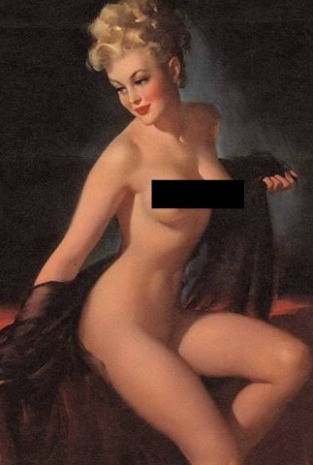According to Webster’s, erotica are “works of art or literature that deal with sex and are meant to cause sexual feelings”, while pornography is “defined as movies, pictures, magazines, etc., that show or describe naked people or sex in a very open and direct way in order to cause sexual excitement”. So what’s the difference? Should it matter? If so, why?
As I believe I have mentioned on the blog before, America was settled by Puritans, the original Right Wing Nut Jobs, and it has had that Peeping Tom attitude about sex ever since. This country obsesses over this subject in a disgusted fever. Legislating morality is a waste of time, as every clergyman caught with his pants down could attest. Sex, and more importantly our reaction to it, is a large part of what makes us human. However, this attitude is the genesis of the popular debate: Art vs. Obscenity.
As beauty is said to be in the eye of the beholder, so too is artistic merit. I know what I think of as art, and your ideas may be different, but they are no less valid. It’s only in a legal context that we come against the serious problem of defining obscenity. “…I know it when I see it…” The quote is famous within this discussion, and I discovered I had no idea where that quote originated. Wikipedia says it should be attributed to Supreme Court Justice Potter Stewart, in 1964, and I was surprised to learn that the entire quotation actually judged the piece in question not to be obscene.
The courtroom used to be the only place this conflict really mattered. Now, in the world of self-publishing, the court of public opinion can make or break an author. If one is writing about everyone’s favorite subject, S-E-X, multiply this a thousand times. How we define a thing does make a difference. If erotica cannot be taken seriously as literature, then pornography must be trash for the masses. *Insert eye roll here.*
So what brought all this up? I obviously think erotica is valid as literature, and an important expression of the human experience. If not, I would certainly not be sharing it with you. I guess it’s about labels. Effectively labeling one’s work can enhance sales, and more importantly to the artist, get one’s work in front of more readers. Specifically, I happened to read a short novel labelled “Contemporary Romance” that my mind labelled “Pornography”. That got me to wondering why. At least 85% of the book was sex, graphically described. There was romance, of a sort, and a bit of a plot, but it hadn’t even been marked as an “Erotic Romance” as one might have expected.
Self-publishing has begotten some unusual and exotic genres, and has enabled authors to create their own and even play with the concept of what makes up “genre”. Who would ever have imagined 10 years ago the existence of the Erotic Romance genre, much less the wild popularity it has achieved? This is not to say that books that would have fit this category were not written. Frankly, when I was a young woman sneaking reads of her grandmother’s historical romances, it was for the sex!
I learned a lot, most of it piquantly naïve. Imagine my surprise when I met my first “cock”! It was not nearly as romantic as the vaguely described “manhood” I’d been reading about. It was years afterwards that I could even type the graphic details without blushing, and I was a precocious reader with a good vocabulary of obscenity before I ever sat down to write it.
As a grown woman, and the author of Switch It ON, I am not sure it does matter. One man’s romance is another’s erotica, and still another’s trashy pornography. Whatever the reader enjoys is a perfectly acceptable form of artistic expression. And those who may be offended? They certainly shouldn’t destroy someone’s reputation with vitriolic reviews. Although I mentally categorized the “Contemporary Romance” differently, I still was able to enjoy it as I experienced it. I would review it favorably, perhaps adding my favorite caveat: not for the faint of heart. If one stumbles upon something “offensive” perhaps to simply note that it was not one’s cup of tea might be a lot more productive than slinging literary acid all over someone’s Goodreads page.
It’s entirely possible that I will be criticized for my judgment of critics, but luckily, I currently have no reputation, positive or negative! In my opinion, lively debate is positive. Character assassination is not. If you enjoy your stimulating reads, share them with the world. If your Puritan soul is scandalized, keep it to yourself!
